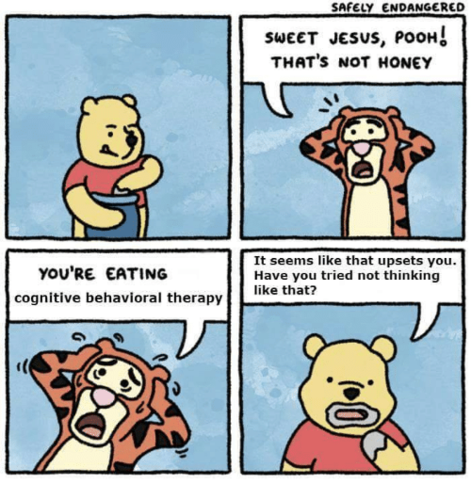Cognitive behavioral therapy
Cognitive behavioral therapy or CBT is the dominant mode of societal treatment of unhappiness. It locates the problem within the individual, and tells people that if they can just adjust their negative thought patterns on their own (or with the prompting of their therapist), their problems will be mostly solved (or appropriately masked).
It is often the case that incels, perceiving their problems as caused almost exclusively by external factors (such as society rather than their own thought patterns), view such treatments in a negative light, and thus rarely seek this type of "treatment".
CBT will not fix external problems[edit | edit source]
Many people argue that socio-economic factors such as low social status, social isolation and poverty are more correlated with unhappiness than compliance with the recovery industry. In particular, prominent academics such as Paul Maloney, Jordan Peterson, and Franco Basaglia also have argued that extreme and persistent mental distress is most often caused by a lack of social validation or subjective loneliness (i.e. feeling socially excluded and undervalued, regardless of actual levels of social interaction). Not only does therapy have no chance of addressing societal inequalities, it allows society to look the other way, and present inceldom an individual weakness or vulnerability, rather than a more or less predictable result of living a marginalised existence in a society that increasingly celebrates social darwinian mating competitions.
This observed similarity between CBT and neoliberalism may be due to the influence of the nineteenth century 'father of Liberalism', John Stuart Mill on modern psychology. As CBT is heavily focused on interventions that concern self-reflection and attempt to alter one's internal dialogue, it is likely that CBT is based on Mill's "introspectionism." Mill emphasized the importance of self-reflection centered approaches to psychology over pure biological ones (the later of which can be said to have influenced the differentiation of psychiatry and psychology).[1]
Effectiveness[edit | edit source]
Some studies have found that talk-therapy (in general) is generally ineffective or perhaps even harmful. In a study called "An analysis of psychotherapy versus placebo studies" published in Cambridge University Press, it reads: "The only studies clearly demonstrating significant effects of psychotherapy were the ones that did not use real patients. For the most part, these studies involved small samples of subjects and brief treatments, occasionally described in quasi-behavioristic language. It was concluded that for real patients there is no evidence that the benefits of psychotherapy are greater than those of placebo treatment."[2]
Chow et al. (2017) found via a longitudinal study (following the groups over time) of the effects of psychotherapy on mental health outcomes (CBT being a very common form of psychotherapy) that talk therapy interventions were actually associated with increased depressive symptoms and increases in certain personality traits often associated with poorer mental health outcomes. The authors found: "Overall, therapy experiences were associated with significant increases in undesirable traits and markers (e.g., chronic stress, depression, neuroticism), and significant decreases in desirable traits (e.g., self-esteem, conscientiousness)."[3]
While it is not possible to fully prove causation in this study due to its design (e.g. is the decline in mental health due to the fact that unstable people are more likely to seek therapy and whether this therapy may attenuate the decline) it does indicate evidence for a general lack of effectiveness of therapy at a minimum.
This finding conflicts with other research that shows a moderate level of effectiveness of certain kinds of talk-therapy, such as CBT, in the treatment of depression and anxiety.[4]
As Chow et al. commented, the difference between outcomes comparing their own studies and the general body of research may be a result of differing methodologies. While most clinical trials into the effectiveness of CBT and other talk-therapies take place in a controlled environment where both the therapists and the patients are highly motivated to engage in high quality therapy sessions and continue them for the prescribed period, their own study used more naturalistic observations. This means that the harmful effects (or reduced effectiveness) may be down to poorly administered therapy or a lack of commitment to said therapy on behalf of patients. Other research has found that most talk therapy, in practice, ignores talk-therapy treatment guidelines and instead focuses on asking open-ended questions about emotional states and advice giving on behalf of the therapists.[5] The typical high expense of such forms of therapy also likely results in a high drop-out rate, especially among those who may need such treatment the most.
See also[edit | edit source]
- Paul Maloney
- Psychiatry
- Gaslighting
- Determinism
- Franco Basaglia
- Scientific Blackpill
- New Age Movement
References[edit | edit source]
- ↑ https://archive.org/details/intellectualhist00robeho pp. 306-307
- ↑ https://www.cambridge.org/core/journals/behavioral-and-brain-sciences/article/an-analysis-of-psychotherapy-versus-placebo-studies/08C6F3704103BE1DE8737138D61BE66B
- ↑ Therapy experience in naturalistic observational studies is associated with negative changes in personality
- ↑ https://pubmed.ncbi.nlm.nih.gov/23870719/
- ↑ https://www.sciencedirect.com/science/article/abs/pii/S0740547208000251
